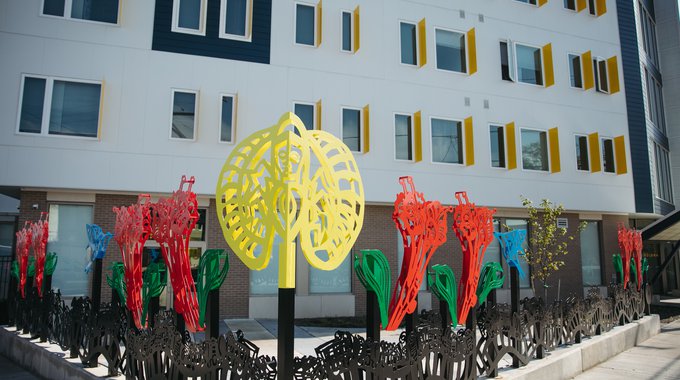LISC Philly & the Latino Equitable Development Collective – Poverty Alleviation in Eastern North Philadelphia

Despite struggling with extreme poverty, historical disinvestment, and lack of access to quality education and resources, Latino serving and led organizations in Eastern North Philadelphia have shown incredible resiliency and the will to transform their communities. Local Initiatives Support Corporation (LISC) Philadelphia is excited to approach these persistent challenges in a new, place-based, collective service delivery model with the Latino Equitable Development Collective (LEDC) through the City and United Way’s Promise Family Stability Challenge.
For over 40 years, LISC has collaborated with community-based organizations to advance equitable community development and restorative justice through neighborhood revitalization, affordable housing solutions and economic stability.
“LISC’s job is to elevate the work of our partners,” says Anna Stormer, LISC’s Communications and Resource Development Officer. “The community-based organizations we work alongside are the on-the-ground experts. To maximize impact, LISC unites commonalities and advances existing initiatives and efforts. “When the Family Stability Challenge opportunity was announced, we were honored to be asked to provide support and enhance the existing structure of the LEDC,” Stormer said.
In keeping with its roles of a trusted intermediary and convener, LISC will elevate the work of six LEDC partners, Asociación Puertorriqueños en Marcha (APM), Ceiba, Congreso de Latinos Unidos, Inc. (Congreso), HACE, Norris Square Community Alliance (NSCA), and Nueva Esperanza (Esperanza). With support from The Promise, LISC is creating a place-based, comprehensive service delivery model, prioritizing serving people in immediate need, while connecting them to a pipeline of opportunities for personal transformation.
Current poverty alleviation efforts tend to be single transactional and siloed, seeking to solve only a presenting problem. That model may not support people building long-term and life-changing solutions. Traditionally, if a client is referred from one LEDC partner to another, the referring partner’s job is done after the referral. Through the LEDC’s collective impact model, if a client comes into Ceiba, for tax preparation for example, the client will also be screened for services at all six partner organizations, and through a warm handoff, referred to another LEDC partner.
This comprehensive, place-based approach builds on existing, data-driven initiatives to reduce ongoing systemic inequities. Activating a wide range of experience and services (health, housing, education, support services, economic development, job training, engagement, etc.) the LEDC’s strategies are underpinned by partners’ strengths and proven models. Leveraging its national network of assessment and evaluation, LISC will be responsible for tabulating and disseminating monthly data collection from across the collaborative. This aggregated data will better inform the exploration of shared data strategies and cross-organizational referrals.
Equitable revitalization and inclusion require a more integrated, community-led, place-and people-centered approach—one designed to build upon community strengths and break down inequities that have left eastern North Philadelphia disconnected and disenfranchised for far too long. With LISC and The Promise’s support, the LEDC will be able to take these commitments many steps further –enhancing communication, messaging, and cross-referrals to rapidly disperse critical resources.
“We can’t pretend that challenges in eastern North don’t affect the city as a whole,” Stormer says. “For Philadelphia’s collective success we have to lift each other up. For the sustainability as a society, it is critical that we start addressing these issues collectively. With the LEDC and The Promise we are doing that in a way rooted in what neighbors want for themselves. And with the support of United Way, the City of Philadelphia, and members of the LEDC, LISC can pull those threads together to enact sustainable change.”